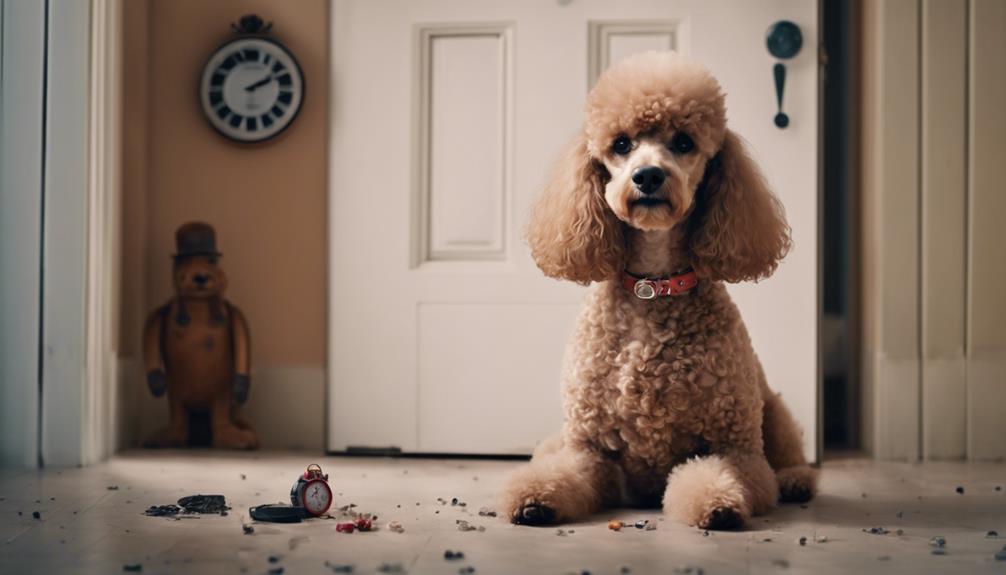To better understand and address Poodle separation anxiety, it's crucial to recognize the signs and implement effective strategies. Imagine coming home to a distressed pet every day, unsure of how to help them. By exploring the root causes and practical solutions, you can significantly improve your Poodle's well-being and strengthen your bond. Discovering tailored methods for managing separation anxiety in Poodles can lead to a harmonious coexistence and a happier furry companion.
Key Takeaways
- Early detection crucial for Poodle well-being.
- Symptoms like barking, destructiveness indicate anxiety.
- Implement behavioral strategies and seek professional help.
- Create a supportive, stable environment for long-term management.
Identifying Poodle Separation Anxiety
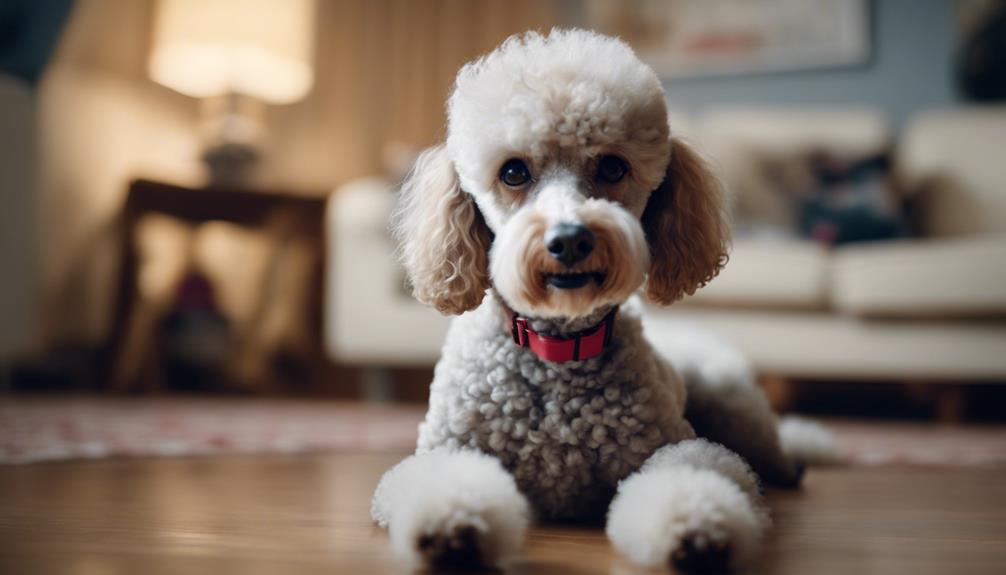
If your Poodle displays destructive behaviors, incessant barking, or signs of distress when left alone, you may be observing symptoms of separation anxiety. Separation anxiety in Poodles can manifest as more than just behavioral issues; it can also lead to depression, crying, and overexcitement upon your return. Early detection of these signs is key to ensuring your Poodle's well-being.
To effectively manage separation anxiety in your Poodle, it's essential to understand the symptoms and causes behind this behavior. By ruling out other potential causes of distress, you can better focus on implementing appropriate training and management strategies. Identifying separation anxiety early on not only helps in addressing the issue promptly but also contributes to better outcomes for your furry companion.
Causes of Poodle Anxiety
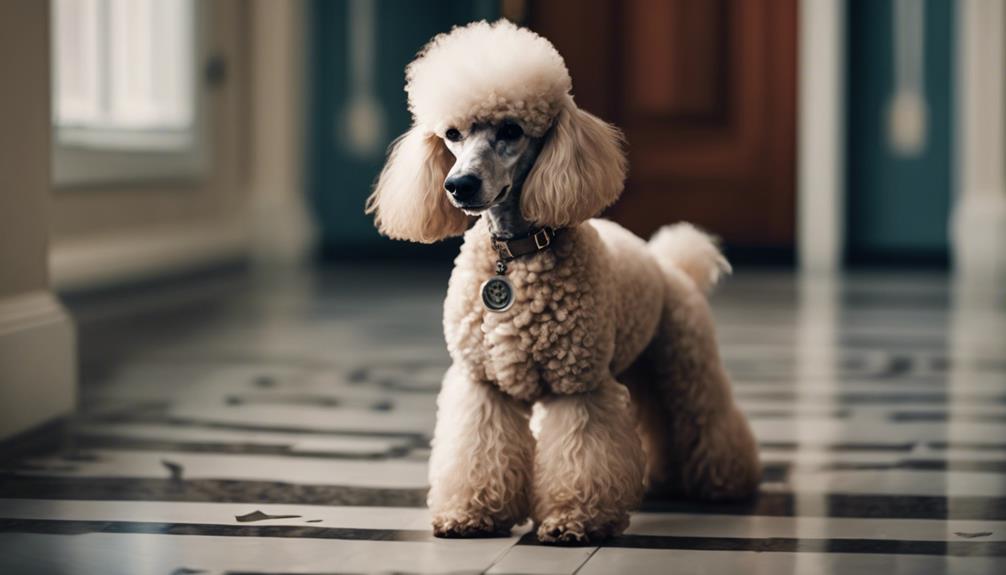
Experiencing Poodle anxiety can be distressing for both you and your furry companion, but understanding the underlying causes is crucial for effective management. Here are three key factors that can contribute to Poodle anxiety:
- Past Neglect and Traumatic Experiences: Poodles that have experienced neglect, abuse, or lack of socialization in the past may be more prone to developing anxiety. Traumatic events can leave a lasting impact on a Poodle's mental well-being.
- Changes in Routine and Environment: Any significant changes in a Poodle's routine, living environment, or family dynamics can act as triggers for anxiety. Poodles thrive on stability and predictability, so disruptions can lead to feelings of unease and stress.
- Strong Bond and Genetic Predisposition: Poodles are known for forming strong bonds with their owners. This attachment, coupled with a genetic predisposition to anxiety, can make Poodles more susceptible to developing separation anxiety when apart from their loved ones. Understanding these causes can help you better support your Poodle through any anxiety they may experience.
Symptoms of Poodle Anxiety
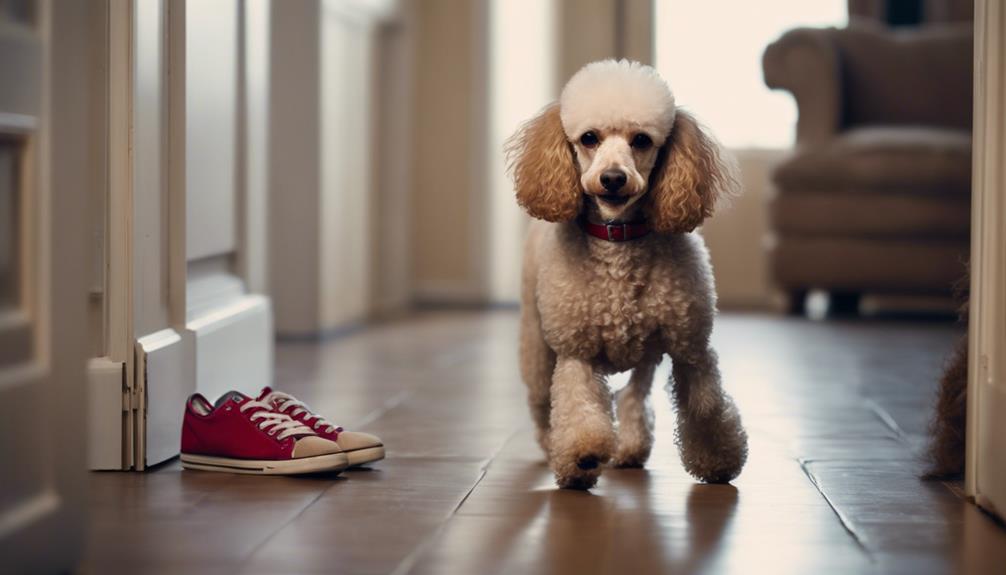
Understanding the signs that indicate your Poodle may be experiencing anxiety is essential for providing timely support and intervention. Poodles with separation anxiety may exhibit various symptoms that can help you identify their distress. Here are some common signs to watch out for:
| Symptom | Description |
|---|---|
| Incessant barking | Your Poodle may bark non-stop when left alone, seeking attention and expressing distress. |
| Destructive behavior | Anxious dogs may chew furniture, shoes, or other items in an attempt to soothe their anxiety. |
| Depression and crying | Poodles with separation anxiety may appear sad, lethargic, and even cry when separated from you. |
Recognizing these symptoms of separation anxiety in your Poodle is the first step towards helping them cope better with being alone. If you notice any of these signs, consider seeking professional help or implementing strategies to manage your Poodle's anxiety effectively. Remember, your support and understanding are crucial in helping your furry companion feel more secure and relaxed.
Managing Poodle Anxiety With Supplements
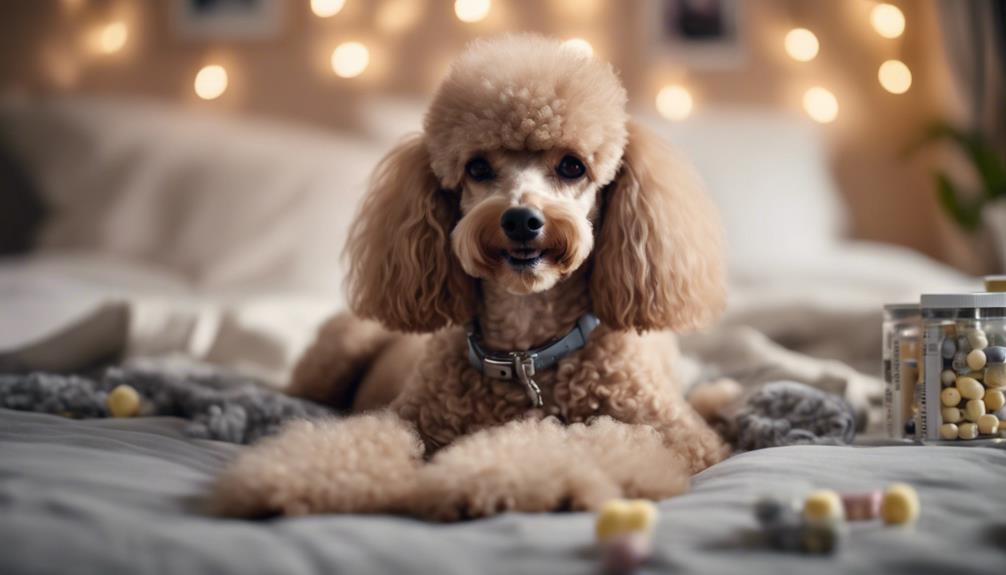
If your Poodle struggles with anxiety, supplements could be a helpful addition to their routine. Different types of supplements, like hemp oil or calming herbs, can be effective in managing their stress levels. Consider the dosage and timing of these supplements to ensure they provide the best relief for your furry friend.
Supplement Types
To manage your Poodle's anxiety effectively, exploring different supplement types can provide valuable support in promoting their overall well-being and calmness. When considering supplements for your Poodle, here are some options to help alleviate their anxiety:
- Hemp Oil: Known to be effective for a majority of dog owners in managing anxiety.
- Certificate of Analysis: Opt for hemp oil with this certification to ensure purity and quality.
- Calming Herbs: Look for supplements containing chamomile, passion flower, ginger root, or valerian root, as these herbs can help reduce stress and provide quick anxiety relief.
Dosage and Timing
When managing your Poodle's anxiety with supplements, ensuring the correct dosage and timing is crucial for their effectiveness and safety. The dosage of supplements varies based on the Poodle's size and weight, so following the manufacturer's instructions is essential. Timing also plays a significant role in the effectiveness of the supplements; some may need to be administered with meals, while others work best on an empty stomach. Consulting with a veterinarian before starting any supplement regimen for your Poodle's anxiety is highly recommended to determine the right dosage and timing for your furry friend. Below is a table to help guide you on the dosage and timing of supplements for managing your Poodle's anxiety:
| Dosage | Timing |
|---|---|
| Based on size | With/Without meals |
| Manufacturer's instructions | Optimal times for absorption |
Behavioral Approaches for Poodle Anxiety
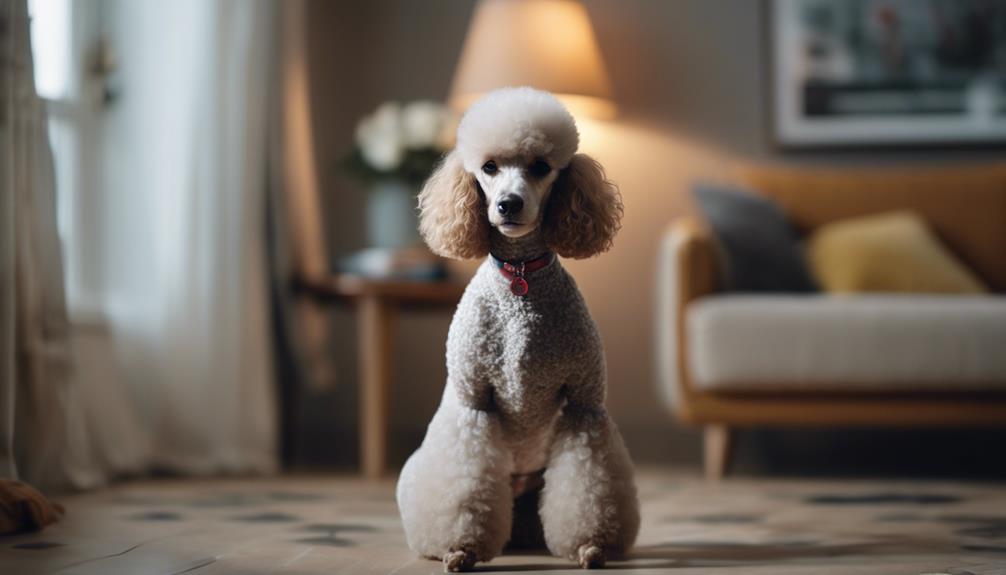
Behavioral approaches can play a crucial role in addressing Poodle anxiety, offering effective techniques to help manage and alleviate their distress. Here are some strategies to consider: Behavioral modification techniques such as desensitization and counterconditioning can help Poodles gradually adjust to stress-inducing situations, reducing their anxiety over time. These methods are particularly useful in managing common behavioral issues in Poodles, such as excessive barking, separation anxiety, or fear of loud noises. Consistent positive reinforcement and establishing a predictable routine can further support their emotional well-being, creating a sense of security and confidence. Consistency and positive reinforcement are key elements in teaching your Poodle to feel secure and calm in various situations. Implementing structured training routines not only helps reduce anxiety but also addresses related behavioral issues by establishing clear boundaries. For instance, incorporating poodle puppy biting solutions into your approach can prevent your dog from developing bad habits while contributing to an overall sense of stability and comfort.
- Desensitization Techniques: Gradually exposing Poodles to anxiety triggers can help reduce their sensitivity over time, making them more resilient in stressful situations.
- Positive Reinforcement Training: Rewarding calm behavior with treats or praise can reinforce positive habits and create a sense of security, particularly when dealing with separation anxiety.
- Distraction Techniques: Redirecting a Poodle's attention from anxiety-inducing stimuli by engaging them in activities like playing or training can help shift their focus and alleviate their anxiety.
Creating a Calm Environment for Poodles
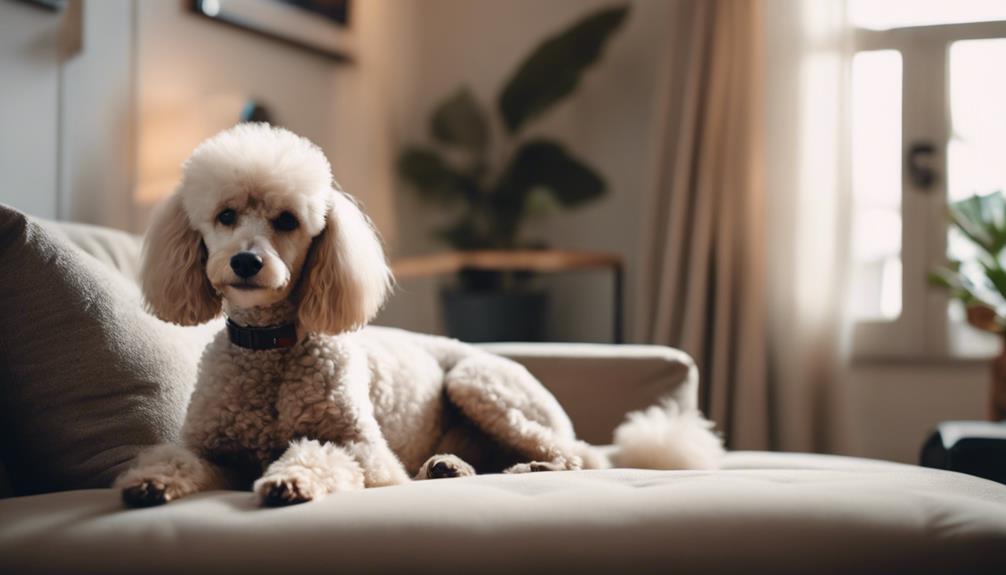
To help create a calm environment for your poodle, consider setting up quiet spaces where your pup can relax undisturbed. Playing soothing sounds or music in the background can also help create a peaceful atmosphere at home for your furry friend. These simple adjustments can go a long way in helping your poodle feel more comfortable and secure when left alone.
Quiet Spaces for Poodles
Creating a peaceful sanctuary for your Poodle can significantly alleviate their anxiety and foster a sense of calm and security. Here are three essential ways to create a quiet space for your furry friend:
- Utilize a Home Security Camera: Set up a home security camera to monitor your Poodle's behavior when you're away, allowing you to keep an eye on them and ensure they are safe and comfortable.
- Play Calming Music: Playing soothing music can help relax your Poodle and create a serene atmosphere in their quiet space, promoting a sense of tranquility.
- Engage with Interactive Toys: Provide your Poodle with interactive toys designed for extended play to keep them mentally stimulated and occupied, reducing anxiety and boredom.
Soothing Sounds at Home
When setting up a quiet space for your Poodle, incorporating soothing sounds at home can be a key element in creating a calm and relaxing environment for your furry companion. Playing calming music can help reduce stress and anxiety in Poodles, while engaging toys designed for prolonged play can distract and comfort your pet when alone. Canine aromatherapy using calming scents is another effective way to create a soothing atmosphere for your Poodle. Additionally, comforting clothing such as Thundershirts can provide gentle pressure to calm anxious Poodles. Teaching bark control techniques properly can also minimize triggers and promote a more peaceful setting for your pet. By incorporating these strategies, Poodle owners can help manage separation anxiety and create a serene space for their beloved companions.
| Soothing Sounds at Home | ||
|---|---|---|
| Calming Music | Engaging Toys | Canine Aromatherapy |
| Comforting Clothing | Bark Control Techniques |
Frequently Asked Questions
How Do You Break a Dog With Separation Anxiety?
To break a dog with separation anxiety, use positive reinforcement, behavior modification, interactive toys, crate training, desensitization exercises, seek professional help, make routine changes, establish an exercise regimen, provide mental stimulation, and consider calming supplements for a holistic approach.
Can a Dog Be Trained Out of Separation Anxiety?
You can train a dog out of separation anxiety by using positive reinforcement, desensitization training, crate training, interactive toys, maintaining an exercise routine, considering calming supplements, seeking professional help, sticking to a consistent routine, and identifying anxiety triggers and separation cues.
Does Ignoring Your Dog Help With Separation Anxiety?
Ignoring your dog when they display separation anxiety behaviors can be challenging, but it's crucial. This approach, along with positive reinforcement, behavioral modification, and consistent routines, helps your pup learn to cope with being alone effectively.
How Do You Stop a Dog Being Anxious When Left Alone?
To stop your dog from feeling anxious when left alone, try incorporating positive reinforcement, desensitization training, interactive toys, and creating a safe space. Routine exercise, calming supplements, professional help, slowly increasing time away, building confidence, and consistent training are key.
Conclusion
You've learned about the challenges of managing Poodle separation anxiety, but don't worry – there are solutions! By understanding the causes and symptoms, incorporating supplements and behavioral approaches, and creating a calm environment, you can help your Poodle feel more at ease. With patience and consistency, you can make a positive impact on your furry friend's well-being. Remember, you're not alone in this journey to support your Poodle through their anxiety.
